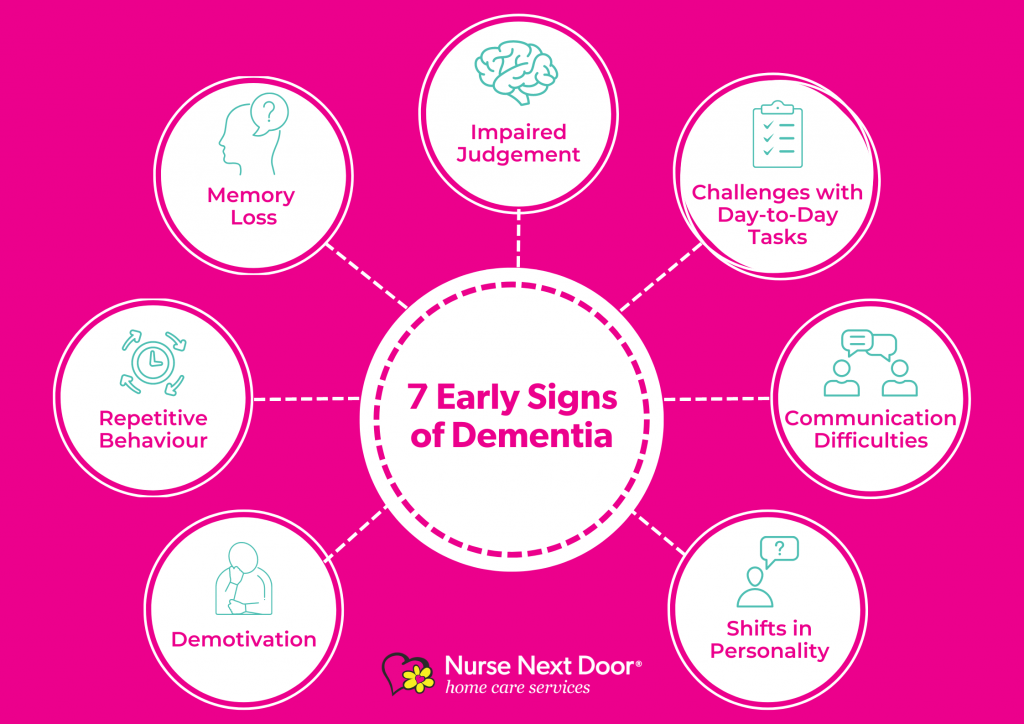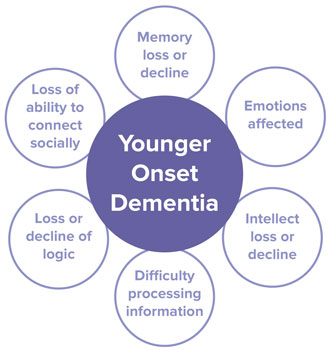Understanding the Impact of Mental Deterioration on Life and Caregiving
Mental deterioration impacts everyday life in profound methods, influencing not simply those diagnosed however also their caregivers. As cognitive decrease proceeds, you might see modifications in communication and regular that challenge both parties.
The Stages of Mental Deterioration and Their Effects on Life
As you browse the journey of mental deterioration, understanding its stages can significantly impact how you handle everyday life. Dementia generally advances through three major stages: early, center, and late.
Throughout the center phase, you'll experience much more noticeable cognitive decline. Daily tasks might end up being challenging, and keeping your independence may need adjustments. Making use of pointers and streamlining your environment can assist.
In the late stage, people frequently require considerable support with everyday tasks. Planning for treatment comes to be necessary, concentrating on convenience and quality of life. By comprehending these stages, you're far better geared up to respond proactively, ensuring you or your enjoyed one can navigate the obstacles with dignity and poise.

Modifications in Interaction and Social Interaction
How do adjustments in interaction affect your everyday interactions as mental deterioration advances? As dementia advancements, you could observe that basic discussions end up being tough. Words may escape you, or you might battle to find the best phrases. This can bring about frustration for both you and your enjoyed ones. Nonverbal cues, like gestures or face expressions, end up being progressively crucial.
You may discover it easier to link through these methods instead of depending solely on talked language. Listening skills can likewise alter; you may locate it tougher to follow discussions or bear in mind what was simply said (Fall Risk). This can cause misconceptions or sensations of seclusion
Encouraging patience and developing a supportive setting can assist. Involving in activities that foster connection, like music or art, can boost social interactions. Remember, keeping connections is still feasible; it's practically adjusting to new means of communicating.
Effect On Daily Routines and Activities
While navigating day-to-day regimens, you'll likely observe that tasks you once completed easily come to be extra challenging as mental deterioration proceeds. You might find yourself neglecting steps in acquainted regimens or having a hard time to remember where you positioned things.
Planning your day can really feel frustrating, making it harder to stay with a routine. You might require suggestions for appointments or to take medicines. Adapting your atmosphere can help; as an example, identifying items or using checklists can streamline tasks. Participating in repeated, organized tasks can also give convenience and a feeling of accomplishment. Remember, it's fine to request help. Surrounding on your own with helpful close friends or family can make taking care of these changes a bit less complicated.
Behavioral and emotional Obstacles
Guiding via everyday regimens can cause not just functional obstacles, but behavioral and additionally psychological ones. You could notice modifications in state of mind, such as enhanced stress and anxiety or irritation, which can originate from confusion or difficulty in completing jobs. As you navigate these minutes, it is vital to recognize that your loved one may express their sensations with habits like anxiety or withdrawal.
These emotional actions can be unpredictable and might occur without caution, leaving you both sensation bewildered. You could discover that acquainted atmospheres or regimens can help in reducing stress and anxiety, yet keeping patience becomes substantial. It is necessary to verify their sensations, also if you do not fully recognize them.
The Duty of Caregivers in Sustaining Individuals With Mental Deterioration
As a caregiver, you play an important function in giving psychological assistance for people with mental deterioration. Establishing day-to-day treatment routines can create a feeling of stability and convenience, aiding to ease their stress and anxiety. By recognizing their requirements and making use of effective approaches, you can considerably boost their quality of life.
Emotional Support Techniques
When caring for someone with dementia, recognizing the emotional landscape is essential for supplying effective support. Straightforward gestures, like holding their hand or maintaining eye contact, can produce a feeling of security. Eventually, do not neglect to take care of your own psychological needs; looking for support for on your own can improve your capability to care for them.
Daily Care Routines
Establishing day-to-day care routines is crucial for supplying security and convenience to individuals with dementia, as these regimens can aid minimize confusion and stress and anxiety. You can start by laying out a regular schedule for dishes, activities, and remainder. This predictability assists your enjoyed one really feel a lot more secure and engaged.
Include familiar tasks, like folding laundry or watering plants, which can stimulate positive memories and promote a feeling of achievement. Usage visual hints, such as checklists or schedules, to direct them with the day.
Be adaptable, though; adapt regimens as needed based upon their state of mind or energy degrees. Early Onset Dementia. Keep in mind, your persistence and understanding are crucial in navigating their altering requirements, ensuring they feel supported and valued throughout their day-to-day live
Developing a Safe and Comfortable Living Setting
Creating a comfy and secure living setting is crucial for individuals with dementia. You'll wish to make home safety modifications that minimize dangers and guarantee knowledge to give a feeling of comfort. By concentrating on these elements, you can help create a room that sustains both security and wellness.
Home Security Modifications
As you navigate the challenges of dementia, making home safety alterations can considerably improve convenience and safety. Begin by eliminating tripping dangers like rugs and mess, assuring walkways are clear. Set up grab bars in shower rooms and non-slip mats in the shower to stop falls. Take into consideration using brighter lights and night lights to boost exposure, specifically throughout nighttime. Label crucial areas, such as the washroom and cooking area, with clear indicators to aid with positioning. find out this here Secure any sharp objects or hazardous substances unreachable. Additionally, evaluate your home's locks and alarms to verify they're straightforward and offer assurance. These alterations not just promote security yet additionally encourage independence, enabling your enjoyed one to really feel even more at ease in their environment.
Comfort and Experience
After making sure a safe atmosphere with required alterations, fostering convenience and knowledge is necessary for individuals with dementia. Start by individualizing their space. Usage acquainted shades, decorations, and photographs that stimulate satisfied memories. A preferred covering or chair can provide a complacency. Maintain a consistent regular to aid them feel based and minimize stress and anxiety. Simple, acquainted meals can likewise produce a reassuring atmosphere. Maintain paths clutter-free and clear to avoid confusion. Include soft lights, as brilliant lights can be disorienting. Consider including comforting fragrances, like lavender, to advertise leisure. Participating in familiar tasks, such as listening to songs or gardening, can boost their sense of belonging, making their living environment a real sanctuary.
Strategies for Efficient Caregiving and Support
While navigating the challenges of dementia treatment can feel frustrating, applying efficient approaches can significantly enhance both the caregiver's and the client's everyday experience. Start by establishing a regimen; predictability helps in reducing stress and anxiety for both you and your enjoyed one. go to this site Usage clear, straightforward interaction-- brief sentences and direct inquiries can protect against confusion.

Do not neglect to take treatment of on your own; routine breaks and attach with support groups. Sharing experiences with others in comparable scenarios can supply valuable understandings and emotional alleviation.
Last but not least, continue to be person and adaptable. Mental deterioration can bring unpredictable changes, so adapting your strategy is essential. By employing these techniques, you can cultivate an extra favorable atmosphere that profits both you and your enjoyed one.
Often Asked Concerns

What Are the Various Types of Dementia?
You'll discover numerous types of mental deterioration, including Alzheimer's, vascular dementia, Lewy body dementia, and frontotemporal dementia. Each type affects memory and cognitive feature in a different way, so recognizing the distinctions is crucial for correct diagnosis and care.
Exactly How Can I Help Someone With Early-Stage Mental Deterioration?
You can assist someone with early-stage dementia by holding your horses, offering assistance, and urging them to involve in tasks they delight in. Maintaining regimens consistent and preserving open communication can also make a significant distinction in their day-to-day live.
Are There Financial Resources Available for Dementia Care?
Yes, there are funds available for dementia care. You can explore entitlement program programs, not-for-profit organizations, and insurance coverage alternatives. It's additionally important to seek advice from local agencies for specific sources tailored to your circumstance.
What Lawful Considerations Should Caregivers Recognize?
As a caretaker, you ought to take into consideration power of attorney, health care proxies, and guardianship regulations. It's important to comprehend the legal rights and duties you hold, guaranteeing your liked one gets proper care and security.
How Can I Manage Caregiver Stress And Anxiety?
You can deal with caretaker tension by focusing on self-care, seeking support from friends or groups, establishing practical assumptions, taking breaks, and exercising relaxation strategies. Keep in mind, your well-being matters equally as high as the person you're taking care of.
Recognizing the Influence of Dementia on Daily Life and Caregiving.
As you navigate the trip of dementia, recognizing its phases can markedly influence how you handle day-to-day life.While navigating everyday regimens, you'll likely observe that i loved this jobs you as soon as completed effortlessly come to be more difficult as dementia advances.Developing day-to-day care regimens is vital for giving security and comfort to individuals with mental deterioration, as these routines can assist lower complication and anxiety.While steering the obstacles of dementia treatment can feel frustrating, implementing effective strategies can considerably improve both the caretaker's and the client's everyday experience.